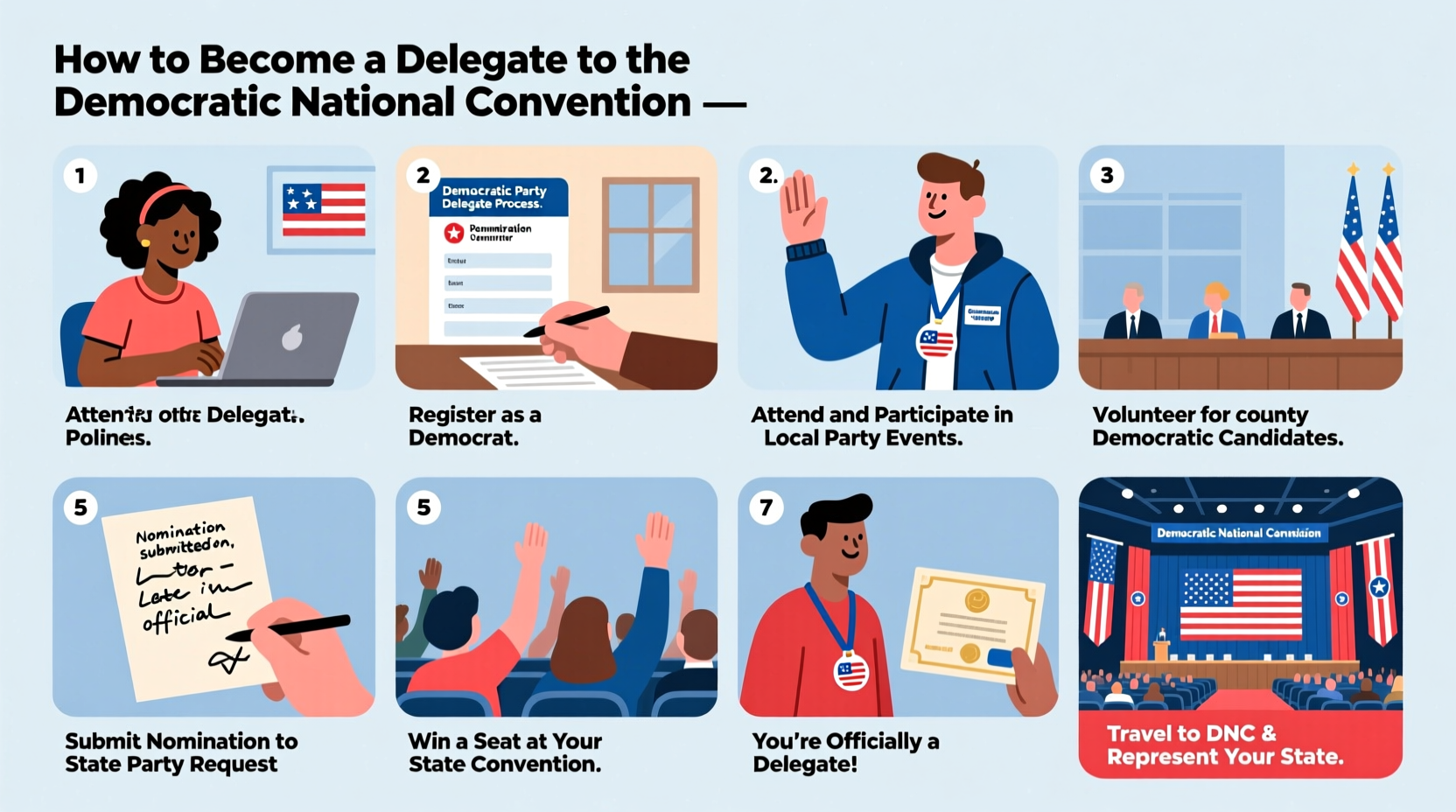The Democratic National Convention (DNC) is one of the most pivotal events in American politics. It's where delegates from across the country formally nominate the party’s presidential candidate, adopt the national platform, and shape the future direction of the Democratic Party. While it may seem like an exclusive gathering, ordinary citizens can—and do—become delegates. With dedication, organization, and a clear understanding of the process, you can earn a seat at the table.
Understanding the Role of a Delegate

Delegates are individuals elected or selected to represent their state, district, or demographic group at the DNC. Their primary responsibility is to cast votes on behalf of their constituents during the presidential nomination process. There are three types of delegates:
- Pledged Delegates: Elected based on the results of primaries or caucuses and are expected to support the candidate who won their district or state.
- Unpledged Delegates (also known as “superdelegates”): Typically current and former party leaders and elected officials who can support any candidate regardless of primary outcomes.
- At-Large and PLEO Delegates: Selected through state party processes to represent broader party interests, such as youth, labor, or minority communities.
Becoming a delegate isn’t just about casting a vote—it’s about participating in shaping party priorities, engaging with national leaders, and amplifying local voices on a national stage.
Step-by-Step Path to Becoming a Delegate
The path varies slightly by state, but the overall structure follows a consistent sequence. Here’s a detailed timeline and checklist to guide your journey.
- Confirm Eligibility: You must be a registered Democrat in good standing. Most states require you to have voted in the primary or participated in local party activities. Age requirements vary; some states require delegates to be at least 18, others 21.
- Choose Your Path: Decide whether you’re running as a pledged delegate tied to a candidate, or seeking an at-large/PLEO (Party Leaders and Elected Officials) slot.
- Research State Rules: Each state party sets its own delegate selection plan. Visit your state Democratic Party website for deadlines, forms, and procedures.
- Align with a Candidate (if applicable): If pursuing a pledged delegate position, you’ll typically need to declare support for a candidate who has qualified for the primary ballot.
- File Required Paperwork: Submit applications, statements of intent, and sometimes endorsements. Some states require petitions or signatures from local party members.
- Campaign Locally: Attend precinct meetings, speak at caucuses, and build support among fellow Democrats. Visibility matters.
- Attend Selection Conventions: Delegates are usually chosen at county or state conventions. Be prepared to give a short speech or answer questions.
- Get Elected or Appointed: Once selected, you’ll receive official confirmation and credentials from your state party.
- Prepare for the Convention: Attend pre-convention briefings, learn parliamentary procedure, and coordinate with your delegation.
State-by-State Comparison: Key Differences in Delegate Selection
While the DNC sets broad guidelines, each state implements its own rules. The table below highlights variations across four key states.
| State | Filing Deadline | Age Requirement | Election Method | Notable Rule |
|---|---|---|---|---|
| California | March 30, 2024 | 18+ | Primary-based + Convention | Requires diversity in slate submissions |
| Iowa | February 15, 2024 | 21+ | Caucus-driven | Must attend multiple caucus levels |
| Texas | April 10, 2024 | 18+ | Primary election + Convention | Delegates pledge to candidate by congressional district |
| New York | May 1, 2024 | 18+ | Appointed via state committee | Strong emphasis on geographic and demographic balance |
Checklist: Are You Ready to Be a Delegate?
Use this actionable checklist to ensure you’re on track:
- ☑ Register as a Democrat in your state
- ☑ Review your state party’s delegate selection plan
- ☑ Choose a candidate to support (for pledged delegates)
- ☑ Complete and submit all required forms by the deadline
- ☑ Build relationships with local party leaders and activists
- ☑ Prepare a 2-minute statement explaining why you should be a delegate
- ☑ Attend your county or district convention
- ☑ Confirm travel and accommodation plans for the DNC
- ☑ Participate in delegation orientation sessions
Real Example: How Maria Became a Delegate from Colorado
Maria Gonzalez, a community organizer from Denver, decided to run for delegate after volunteering on multiple local campaigns. In 2023, she began attending Democratic caucuses in her county, building credibility and connections. When the delegate application opened in January 2024, she applied as a pledged supporter of a leading candidate.
She submitted a personal statement highlighting her work in voter outreach and environmental justice. At the county assembly, she delivered a compelling two-minute pitch and was elected as one of ten delegates. Over the next few months, she attended training webinars hosted by the Colorado Democratic Party and coordinated with her delegation on messaging and logistics.
“Being a delegate wasn’t just an honor,” Maria said. “It was a chance to bring working-class voices into national conversations. I spoke with other delegates from rural areas, union reps, and young activists. That collective energy shaped how we approached the platform debates.”
Expert Insight: What Party Leaders Look For
“We don’t just want delegates who show up—we want those who engage. Reliability, passion for democratic values, and the ability to represent diverse constituencies matter more than political experience.” — Lisa Chen, DNC Rules Committee Member
According to party insiders, successful delegates demonstrate commitment beyond a single election cycle. They’re active in local party committees, participate in outreach efforts, and understand the mechanics of grassroots organizing. Being well-informed about the party platform and current policy debates also strengthens your candidacy.
Frequently Asked Questions
Can I become a delegate if I’m not affiliated with a candidate?
Yes. While pledged delegates must align with a candidate, at-large and PLEO (Party Leaders and Elected Officials) delegates are often selected based on service, diversity, and leadership—without requiring a specific candidate endorsement.
Do delegates get paid?
No, delegate positions are unpaid volunteer roles. However, many state parties provide partial reimbursement for travel, lodging, and meal expenses during the convention week.
What happens if my candidate drops out before the convention?
If a candidate withdraws, their pledged delegates are typically released and may support another candidate or remain uncommitted, depending on state rules. Some states allow reallocation; others hold new elections.
Final Steps and Preparation
Once selected, your responsibilities increase. You’ll likely join weekly calls with your state delegation, review draft platform planks, and prepare for credentialing at the convention site. Familiarize yourself with the Democratic Party Rules, especially Article II, which governs delegate selection.
Bring copies of your ID, delegate credentials, and a printed agenda. Dress professionally—many events are formal. Most importantly, stay engaged. The convention floor is where speeches are made, coalitions are built, and history unfolds.
Conclusion: Take Your Seat at the Table
Becoming a delegate to the Democratic National Convention is more than a title—it’s civic participation at its highest level. Whether you're motivated by policy change, representation, or party loyalty, the process rewards preparation, persistence, and authenticity. Thousands of Americans just like you have walked this path, from small-town precincts to the national spotlight.









 浙公网安备
33010002000092号
浙公网安备
33010002000092号 浙B2-20120091-4
浙B2-20120091-4
Comments
No comments yet. Why don't you start the discussion?